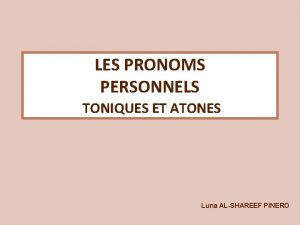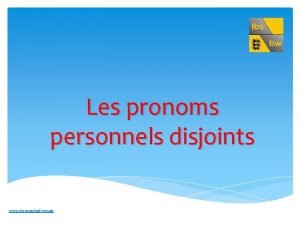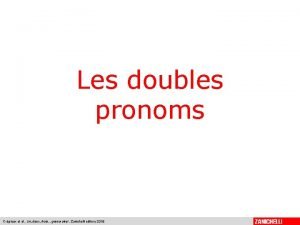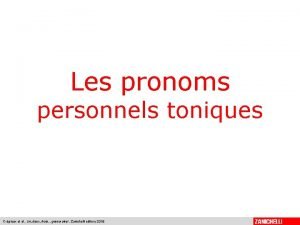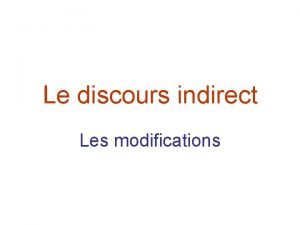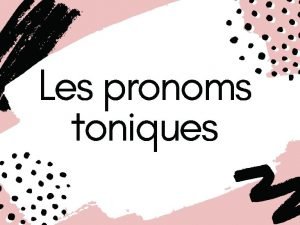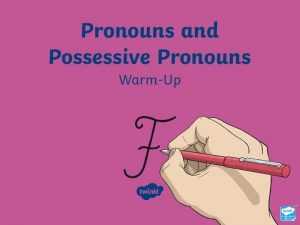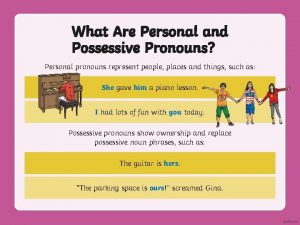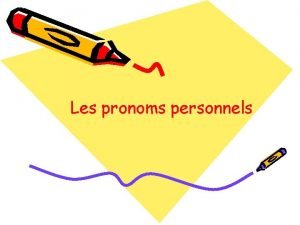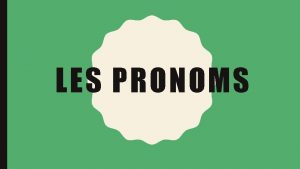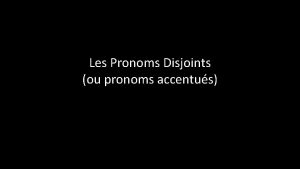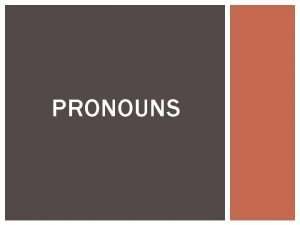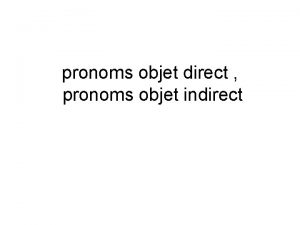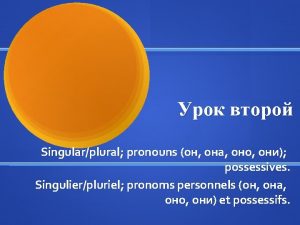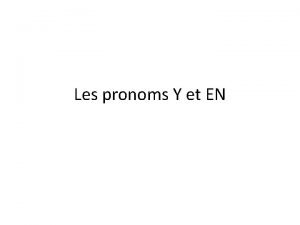LES PRONOMS PERSONNELS LES PRONOMS PERSONNELS Pronouns are
















- Slides: 16

LES PRONOMS PERSONNELS

LES PRONOMS PERSONNELS Pronouns are used to replace people and things to avoid repetition. Personal pronouns have different forms to match the different grammatical persons they replace. There are five different kinds of French personal pronouns, some of which are identical, which can make it tricky to grasp which is which.

LES PRONOMS PERSONNELS: SUJET JE TU VOUS IL ILS ELLE S NOUS ON

REPLACE THE UNDERLINED NOUN WITH THE CORRECT PRONOUN • 1. Le président parle aux citoyens. • 1. IL parle aux citoyens. • 2. La mouche est dans la classe. • 2. ELLE est dans la classe. • 3. Marie et moi travaillons ensemble. • 3. NOUS travaillons ensemble. • 4. Les étudiants sont responsables. • 4. ILS sont responsables. • 5. Marybelle et toi jouez au soccer. • 5. VOUS jouez au soccer. • 6. Justine et Lucie parlent anglais. • 6. ELLES parlent anglais.

LES PRONOMS PERSONNELS: COMPLÉMENT DIRECT • You can find the direct complement pronoun by asking the question “who” or “what” • They have friends. • They have what? • friends • Ils ont des amis. • Ils ont quoi? • Des amis

ME TE LES PRONOMS PERSONNELS: COMPLÉMENT DIRECT LE LA NOUS VOUS LES

LES PRONOMS PERSONNELS: COMPLÉMENT DIRECT • You use this group of pronouns for the same reason as any other pronoun: to avoid repetition. • Examples: • Marie parle le français. • Elle le parle. • * The direct complement pronouns are always placed in front of the verb.

REPLACE THE UNDERLINED NOUN WITH THE CORRECT PRONOUN • 1. Le président écrit des discours. • 1. IL les écrit • 2. La mouche énerve nous. • 2. ELLE nous énerve. • 3. Marie et moi achetons la peinture. • 3. NOUS l’achetons. • 4. Les étudiants aiment toi. • 4. ILS t’aiment. • 5. Marybelle et toi lisez des livres. • 5. VOUS les lisez. • 6. Justine et Lucie parlent anglais. • 6. ELLES le parlent.

LES PRONOMS PERSONNEL: COMPLÉMENT OBJET INDIRECT ME TE LUI NOUS VOUS LEUR

LES PRONOMS PERSONNEL: COMPLÉMENT OBJET INDIRECT • It is important to understand the difference between direct and indirect object pronouns in English, as they can have different forms in French: • an indirect object answers the question who to/for? or to/for what? • He gave me a book. → Who did he give the book to? → me (=indirect object pronoun) • Can you get me a towel? → Who can you get a towel for? → me (=indirect object pronoun)

LES PRONOMS PERSONNEL: COMPLÉMENT OBJET INDIRECT • if something answers the question what or who, then it is the direct object and NOT the indirect object • He gave me a book. → What did he give me? → a book (=direct object) • Can you get me a towel? → What can you get me? → a towel (=direct object)

EXEMPLES: Il nous écrit tous les jours. He writes to us every day. Ils te cachent quelque chose. They’re hiding something from you.

EXEMPLES • The pronouns shown in the table are used instead of the preposition à with a noun. • J’écris à Suzanne. I’m writing to Suzanne. → Je lui écris. I’m writing to her. • Donne du lait au chat. Give the cat some milk. → Donne-lui du lait. Give it some milk. • Some French verbs like demander à (meaning to ask) and téléphoner à (meaning to phone) take an indirect object even though English uses a direct object. Il leur téléphone tous les soirs. He phones them every evening

LES PRONOMS: PRATIQUER LAregarde. • 1. Je regarde la télévision. Je ____ • 2. Maurice parle à son amie. Maurice ____ LUI parle. LES a lus. • 3. Il a lu les livres. Il _____ • 4. Paul n’aime pas attendre le bus. Paul ne ___ L’ aime pas. LES • 5. Elle donne les fleurs à sa mère. Elle ____ LUI donne. _____ • 6. N’oublie pas de téléphoner à Jean! N’oublie LUI pas de ____ téléphoner.

LES PRONOMS PERSONNELS LEregarde chez Eric. • 1. Tu regardes le match chez Joseph? Non, je ______ • 2. Est-ce que tu as écrit au président? Oui je ___ LUI ai écrit hier. • 3. Tu offres les cadeau à tes enfants? Oui je ___LESLEUR _____ offre. LES faut. • 4. J’aime ces chaussures, il me _______ LA construisent en bois. • 5. Phil et Eric construisent une maison, ils _____ • 6. Posez des questions au professeur quand vous ____LE voyez.

LES PRONOMS PERSONNELS • 1. Vous regardez la télé tous les jours? Oui, je la regarde chaque jour. • _________________________ • 2. Vous aimez les frites? Oui, je les aime beaucoup. • _________________________ • 3. Vous parlez à Marie ce soir? Oui, je lui parle ce soir. • _________________________ • 4. Avez-vous téléphoné à votre avocat? Oui, je lui ai téléphoné hier. • _________________________
 Mikael ferm
Mikael ferm Les pronoms toniques exercices
Les pronoms toniques exercices Pronom personnel conjoint et disjoint
Pronom personnel conjoint et disjoint Pronoms doubles
Pronoms doubles Les pronoms personnels toniques
Les pronoms personnels toniques Pronoms personnels compléments
Pronoms personnels compléments Het persoonlijk voornaamwoord
Het persoonlijk voornaamwoord Pronom réfléchi
Pronom réfléchi Discours direct et indirect pdf
Discours direct et indirect pdf Remplacez les mots soulignes par les pronoms convenable
Remplacez les mots soulignes par les pronoms convenable Mode verbaux
Mode verbaux Les noms suivants
Les noms suivants Subject pronouns exercises
Subject pronouns exercises Personal and possessive pronouns
Personal and possessive pronouns Personal vs possessive pronouns
Personal vs possessive pronouns Possessive pronouns interrogative
Possessive pronouns interrogative Reflexive pronouns and reciprocal pronouns
Reflexive pronouns and reciprocal pronouns

